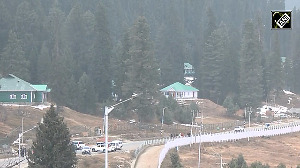India seeks newer horizons in space as it readies to test launch its first air-breathing rocket soon, a step that would make satellite launches cheaper. In his 'Report to the People', Prime Minister Manmohan Singh noted the successful flight testing of a new rocket designed to test futuristic air-breathing propulsion technology. "Successful flight testing of new generation high performance sounding rocket (ATV-D01), conducted on 3rd March 2010 from the Satish Dhawan Space Centre (SDSC), SHAR, has provided a test bed for demonstration of Air-Breathing propulsion technology," said the report presented by Singh on achievements of the first year of UPA-II government.
The ATV-D01 carried a passive scramjet engine combustor module designed to test air-breathing propulsion technology. The new rocket will drastically reduce the cost of launch vehicles as scramjet engines use oxygen in the atmosphere to propel the spacecraft unlike conventional rockets that carry both oxygen and chemical fuel on board. Singh also listed the success of the static tests of next generation satellite launch vehicle GSLV Mark III among achievements of the government in the fields of science and technology.
"The large solid stage motor S-200, which successfully underwent static tests at SDSC on 24th January 2010 is the third largest solid booster in the world. S-200 is used in Geosynchronous Satellite Launch Vehicle Mark III," it said.
Chandrayaan-I, ISRO's maiden moon mission finding water on the lunar surface, efforts to set up a third research station at Antarctica and a dedicated centre for climate research were the other achievements listed in the report. Singh outlined the government's efforts in setting up a string of institutes for research in health and food sectors and creation of three new bio-clusters with a focus on training and fundamental, applied and product-oriented research.
India became a partner in the International Cancer Genome Consortium to generate comprehensive, high-resolution analyses
of genomic changes for eight forms of cancer, the report said. A move that would enable scientist enjoy commercial benefits of their inventions and patents has been highlighted. "For the first time researchers have been permitted an equity stake in scientific enterprises and spin-offs while still being employed in their organisations," it said.





